If resisters can encourage more people to evade more taxes, even if they do so for non-idealistic reasons, this both takes resources away from the government and increases the number of targets the tax enforcers have to pursue, thereby taking some pressure off of the resisters.
Today I’ll cover how tax resistance movements can contribute to tax evasion in the culture at large. (At the same time I’ll give a sneak preview of some of the slides I’m preparing for my upcoming talk in Colombia — beware: I haven’t asked anyone to proofread my shoddy Spanish translations yet.)
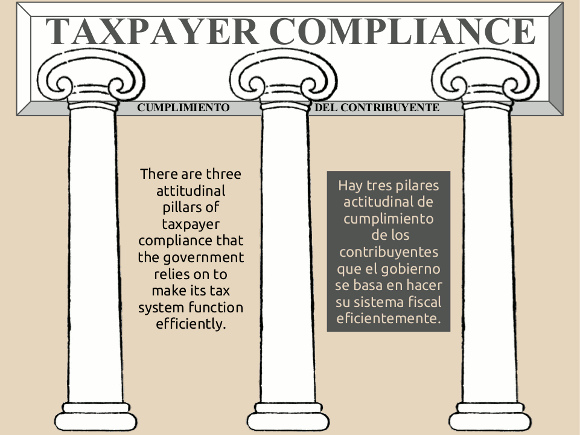
Taxpayer compliance is a challenge for governments to create and maintain, and they spend a lot of effort trying to understand the mechanics of it and engage in a lot of propaganda and other forms of manipulation in order to bring it about.
I’m reminded of the Disney short The Spirit of which told theatergoers that it was Taxes that would Defeat the Axis… or the short film The Tsippori Affair produced by Israel’s propaganda department (with American help) that showed shocked audiences what would happen if nobody paid their taxes (for instance, the schools would all shut down, and school-aged children would lounge about playing cards, drinking wine, and smoking cigarettes).
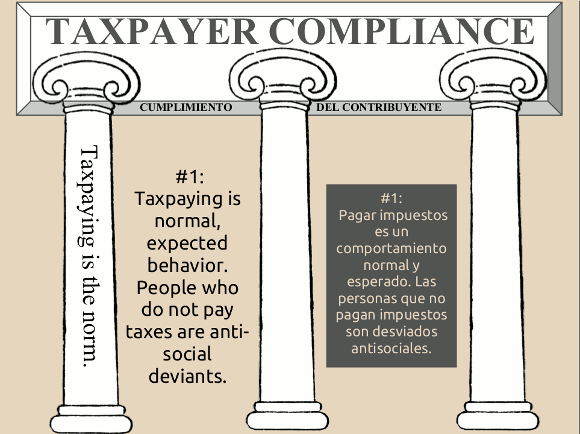
I’ve noted before one of the ways the IRS supports this pillar. Every year they conduct something they call the “Taxpayer Attitude Survey” in which they ask a set of questions to 1,000 randomly-phoned American households. The survey contains carefully-loaded questions like these (emphasis mine):
- How much, if any, do you think is an acceptable amount to cheat on your income taxes?
- [Do you agree that] it is every American’s civic duty to pay their fair share of taxes?
- [Do you agree that] everyone who cheats on their taxes should be held accountable?
Predictably, people overwhelmingly report that cheating is bad and fair shares are good. The IRS then puts out a press release about how Americans overwhelmingly believe everybody should pay what the government tells them to. Typically the news media go along with it, composing stories that follow the press release script.
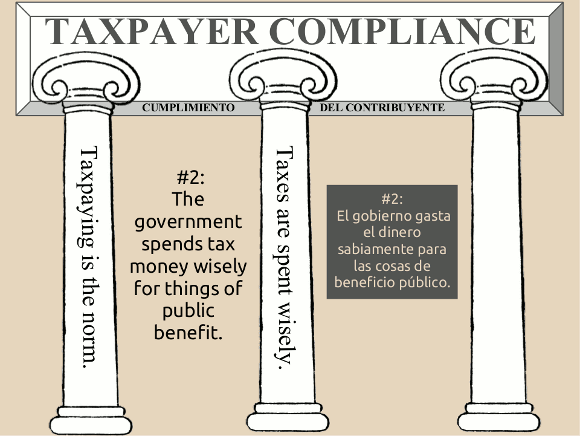
The government is always eager to draw your attention whenever it spends your money on something nice. There’s hardly a bridge, library, overpass, park, or other partially-public-funded thing in my town that doesn’t come with a plaque attached, listing the names of the city councillors and mayor who signed off on it — though that’s about all they had to do to get such credit.
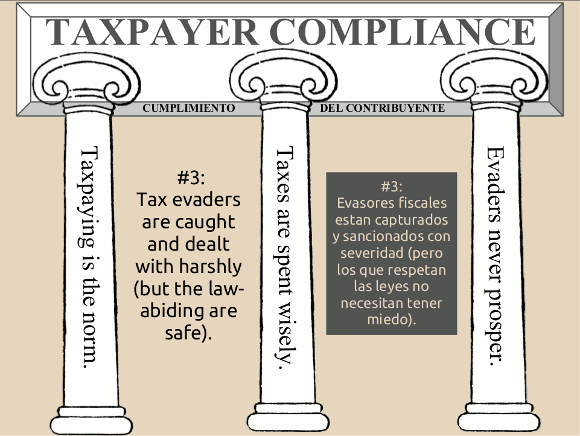
This is why in the weeks before Tax Day, the IRS breathlessly announces indictments against famous people and big-time tax evaders. Don’t think of stepping out of line, they’re saying, because you’re sure to get caught. Anecdotes speak stronger than statistics here.
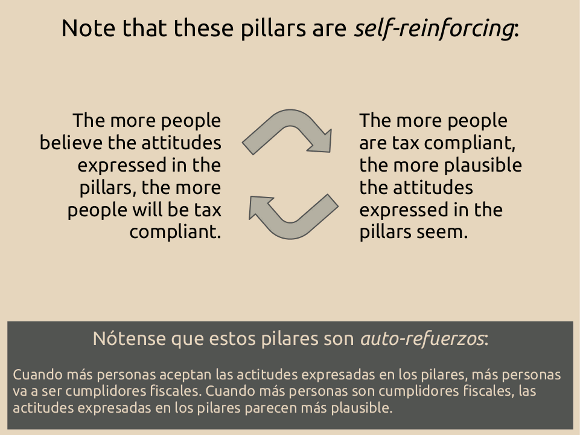
It takes a lot less work for the government to keep taxpayer compliance from slipping from 90% to 80% than it does for the government to raise taxpayer compliance from 80% to 90%.
If taxpayer compliance is high, taxpayers will convince themselves of the attitudes in the pillars. Why am I allowing myself to be fleeced like this? Well, I must have good reasons: it’s because I’m a good citizen, and I want to contribute to useful things, and besides if I don’t I’ll get caught. Everybody knows these things.
If taxpayer compliance is low, taxpayers have to be convinced — they ask instead: Why am I allowing myself to be fleeced like this (when so many other people aren’t)? Am I getting played?
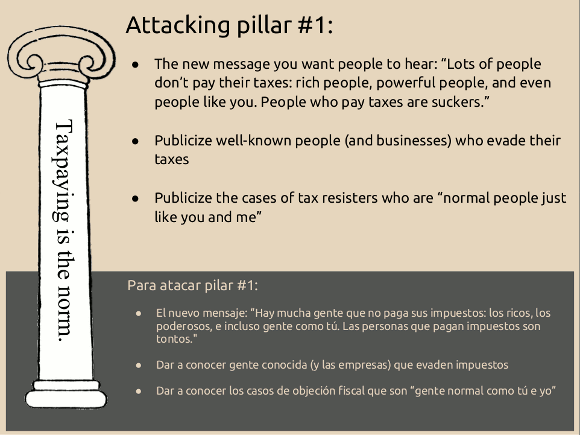
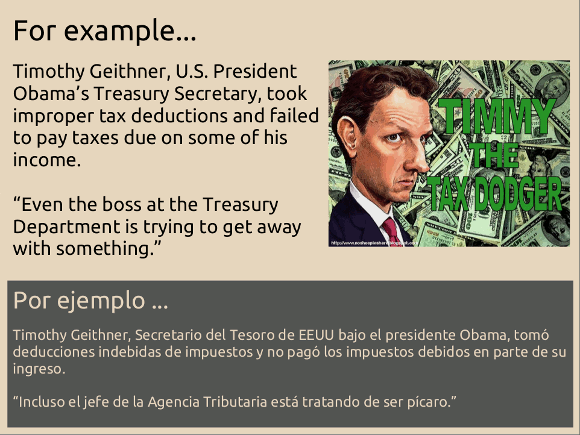
It is easy to point out how many wealthy people and fat corporations get away with paying little or no taxes. I won’t list examples here as I’m sure you’ve heard plenty, but here’s one way a group of war tax resisters made this a little more in-your-face:
At , a merry band of activists from the local [Bangor, Maine] Peace & Justice Center swapped their cozy jeans & t-shirts for swanky gowns & tuxedos, hopped in a verrry conspicuous white stretch-limo, and motored their way to the P.O./Federal Bldg., to perform a bit of satire-filled street theater.
This division of the “Rich People’s Liberation Front” did a skit to expose the huuuge tax breaks which America’s corporations & our wealthiest citizens receive; then thanked intrigued passersby with Dum-Dum lollipops. (“Suckers for the suckers!”)
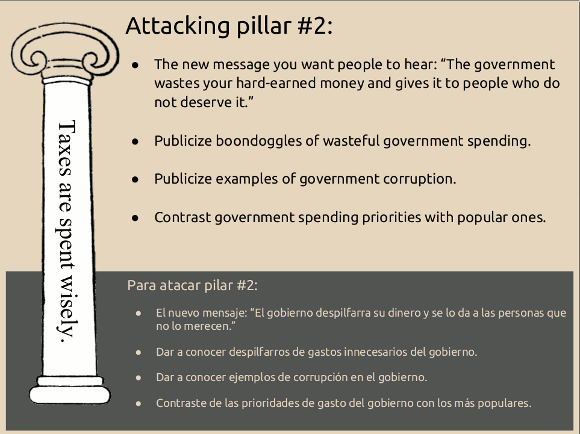
This is related to what tax geeks call the “salience” of taxation — that is, how aware you are of the hand that is picking your pocket. If you had to write a check to Washington every couple of weeks, your income tax would be very salient. If the money is automatically withheld from your paycheck before you get your hands on it, it’s less salient. If it’s invisibly included in the price of the goods you buy, it’s less salient still. Governments are eager to find ways to tax people in ways that make them less aware that they’re being taxed, because the less you’re aware of it the less you’ll resist.
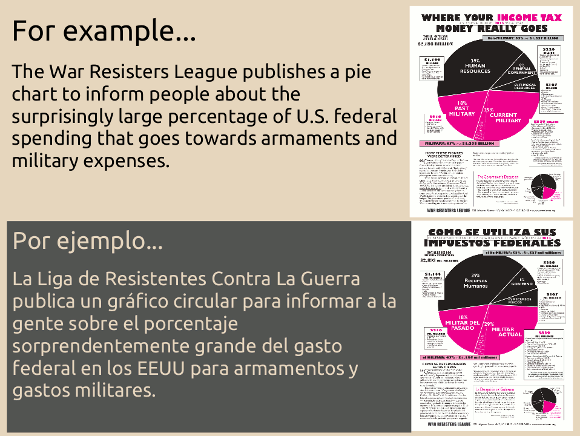
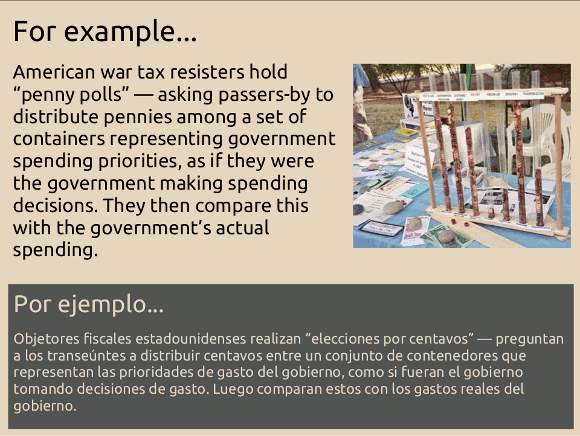
There are many other similar examples, both from the war tax resistance movement and from other movements:
- The “Death and Taxes” poster is a great infographic about U.S. government spending priorities.
- The Tax Foundation raises a ballyhoo every year about what it calls “Tax Freedom Day” — “the day when the nation as a whole has earned enough money to pay off its total tax bill for the year” and which lately has been arriving about the same time as federal income tax returns are due, which increases the publicity impact.
- The Mennonite Central Committee turned the penny poll idea into an on-line game; another site put together a $3 trillion dollar shopping spree to give people an idea of what kind of cool things they could be investing in if the government weren’t spending all that money on war.
- Libertarian Party activists often will hand out fake million dollar bills, each one printed with an estimate of how quickly the government spends that much money. Another tack is to hand out “Certificates of Debt” that show how much government debt each American taxpayer is on the hook for.
- One war tax resistance group held a “Tax Day” protest in which they facetiously labeled the mailboxes down at the post office with the names of military contractors like Lockheed-Martin, Halliburton, and Bechtel, to point out where the money was really going to end up.
- “April 15th is ‘Support the Pentagon’ Day” read ads in the New York Times . Under this headline, a cartoon showed a hapless taxpayer with a bit in his mouth, with a load of generals, admirals, and armaments on his back.
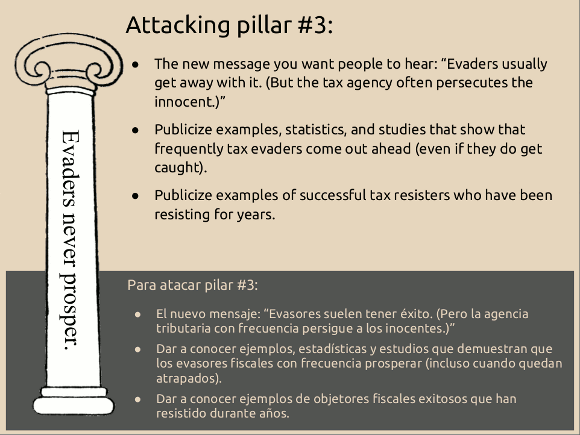
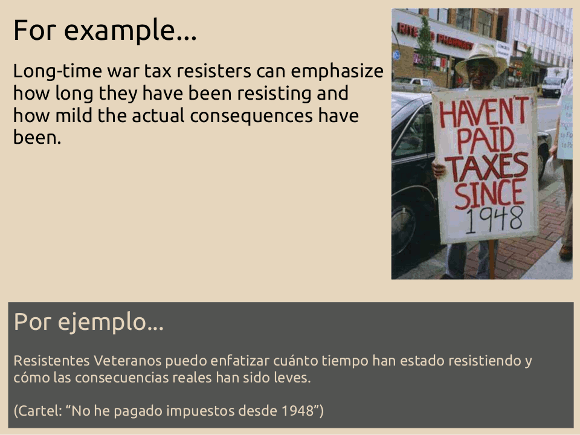
On a few occasions, tax resisters have turned themselves in to law enforcement as a way of showing how little they are afraid of prosecution. For instance, in Australia’s Northern Territory in , “the residents drew up a monster petition, which almost everybody signed, and insisted on the government standing up to its own laws by taking action against them. They also defied the government to put them into jail.” And in , three war tax resisters went to the IRS headquarters in Washington to turn themselves in. “If the resisters are not arrested and prosecuted,” Mary Loehr of NWTRCC said (and they weren’t, and still haven’t been), “it will expose the myth that people go to jail for not paying their taxes.”
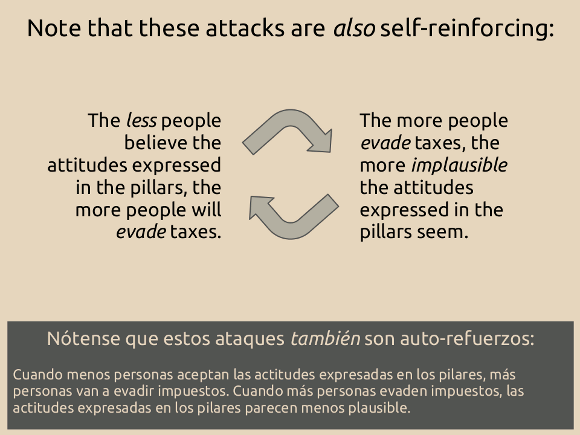
As professor James C. Scott said of his studies of resistance to government-mandated tithes in Malaysia, once tax resistance “has become a customary practice it generates its own expectations about what is permissible [and] raises the political and administrative costs for any regime that subsequently decides it will enforce the rules in earnest. For everyday resisters there is safety in numbers and successful resistance builds its own momentum.”
The examples I have given here are largely indirect ways of promoting a cultural atmosphere in which tax evasion seems like more of a good idea. But there are also more direct ways in which people can assist in the tax evasion of others. I’ve already mentioned the tactic of paying in cash so that your transactions leave less of a paper trail for the government to follow. Here are a couple of others:
- You can spread rumors that a tax has been abolished. This worked with great success at the time of the French Revolution, when such rumors became self-fulfilling prophecies. This was also common in Czarist Russia, when people extrapolated from the propaganda-fuelled image of a benevolent Czar to conclude that such a Czar must have abolished such awful taxes. And the present day United States has long had a cottage industry of people who are convinced (and convincing) that the real United States Constitution would never permit something as awful as the federal income tax.
- You can manufacture the paraphernalia of tax evasion. For example, in Mexico City, you can visit a taco stand and walk away not only with lunch, but — for a small price — with fake receipts from a variety of restaurants, hotels, and stores, that you can then use to declare business expenses on your tax returns.
